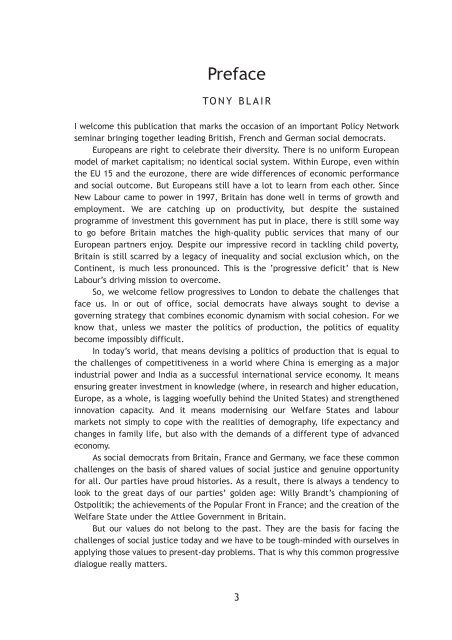Where Now for European Social Democracy? - Policy Network
Where Now for European Social Democracy? - Policy Network
Where Now for European Social Democracy? - Policy Network
Create successful ePaper yourself
Turn your PDF publications into a flip-book with our unique Google optimized e-Paper software.
PrefaceTONY BLAIRI welcome this publication that marks the occasion of an important <strong>Policy</strong> <strong>Network</strong>seminar bringing together leading British, French and German social democrats.<strong>European</strong>s are right to celebrate their diversity. There is no uni<strong>for</strong>m <strong>European</strong>model of market capitalism; no identical social system. Within Europe, even withinthe EU 15 and the eurozone, there are wide differences of economic per<strong>for</strong>manceand social outcome. But <strong>European</strong>s still have a lot to learn from each other. SinceNew Labour came to power in 1997, Britain has done well in terms of growth andemployment. We are catching up on productivity, but despite the sustainedprogramme of investment this government has put in place, there is still some wayto go be<strong>for</strong>e Britain matches the high-quality public services that many of our<strong>European</strong> partners enjoy. Despite our impressive record in tackling child poverty,Britain is still scarred by a legacy of inequality and social exclusion which, on theContinent, is much less pronounced. This is the ‘progressive deficit’ that is NewLabour’s driving mission to overcome.So, we welcome fellow progressives to London to debate the challenges thatface us. In or out of office, social democrats have always sought to devise agoverning strategy that combines economic dynamism with social cohesion. For weknow that, unless we master the politics of production, the politics of equalitybecome impossibly difficult.In today’s world, that means devising a politics of production that is equal tothe challenges of competitiveness in a world where China is emerging as a majorindustrial power and India as a successful international service economy. It meansensuring greater investment in knowledge (where, in research and higher education,Europe, as a whole, is lagging woefully behind the United States) and strengthenedinnovation capacity. And it means modernising our Welfare States and labourmarkets not simply to cope with the realities of demography, life expectancy andchanges in family life, but also with the demands of a different type of advancedeconomy.As social democrats from Britain, France and Germany, we face these commonchallenges on the basis of shared values of social justice and genuine opportunity<strong>for</strong> all. Our parties have proud histories. As a result, there is always a tendency tolook to the great days of our parties’ golden age: Willy Brandt’s championing ofOstpolitik; the achievements of the Popular Front in France; and the creation of theWelfare State under the Attlee Government in Britain.But our values do not belong to the past. They are the basis <strong>for</strong> facing thechallenges of social justice today and we have to be tough-minded with ourselves inapplying those values to present-day problems. That is why this common progressivedialogue really matters.3



